
Department of Physics
Overview
The Physics Department was constituted in 1972. It started with three faculty members and a batch of 40 students in B.Sc. (Hons.) Physics. The classes were held in the Department of Physics and Astrophysics, University of Delhi.
The Department shifted to the College in December, 1988. Since then, the Department has grown in terms of academics, research and faculty strength. Today, the Department has over 20 faculty members, bearing diverse research interests. This lends strength to the under-graduate teaching in the Department.
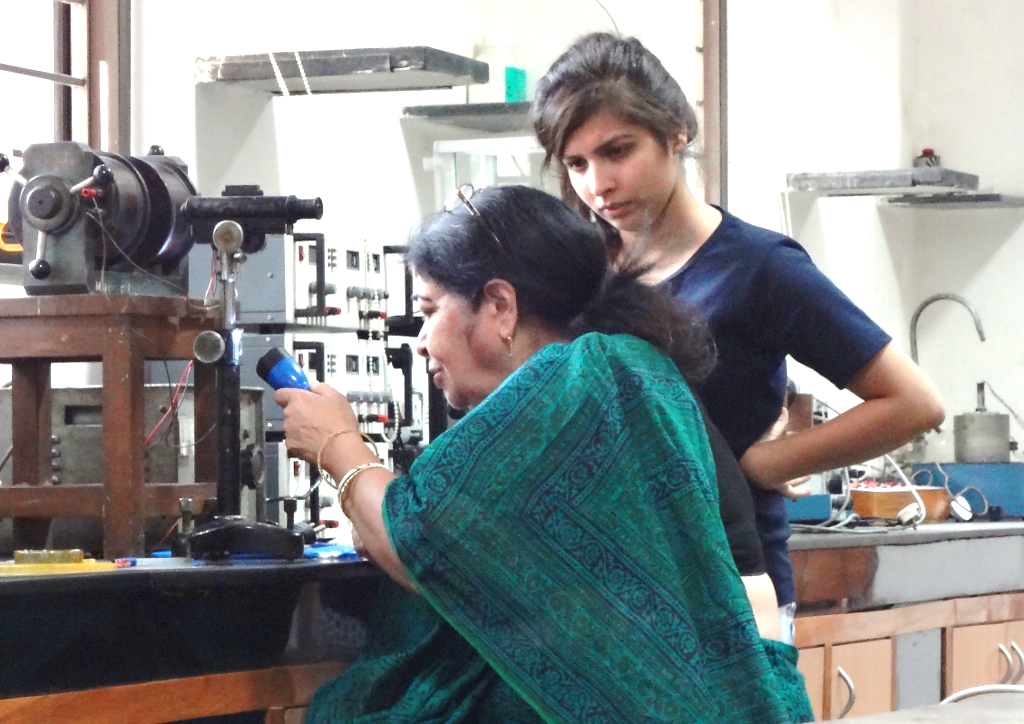
The Department caters to over 400 students every year. Besides offering core papers to students of B.Sc. (Hons.) Physics, the Department offers Generic Elective papers to students of other disciplines, and Physics papers to B.Sc. Applied Physical Sciences.
There are well equipped teaching laboratories, computer labs and a Departmental Library. Laying special emphasis on innovation and quality of the research projects carried out by students, the Department hosts a Project Laboratory, with several state-of-the-art research facilities, and a multidisciplinary Computer-based Laboratory that meets global benchmarks.
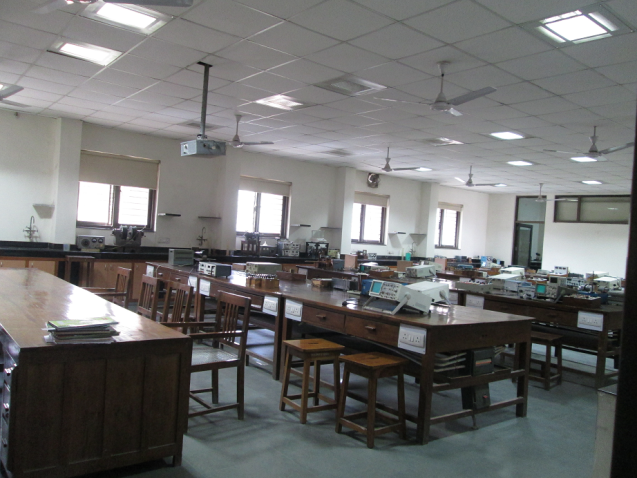
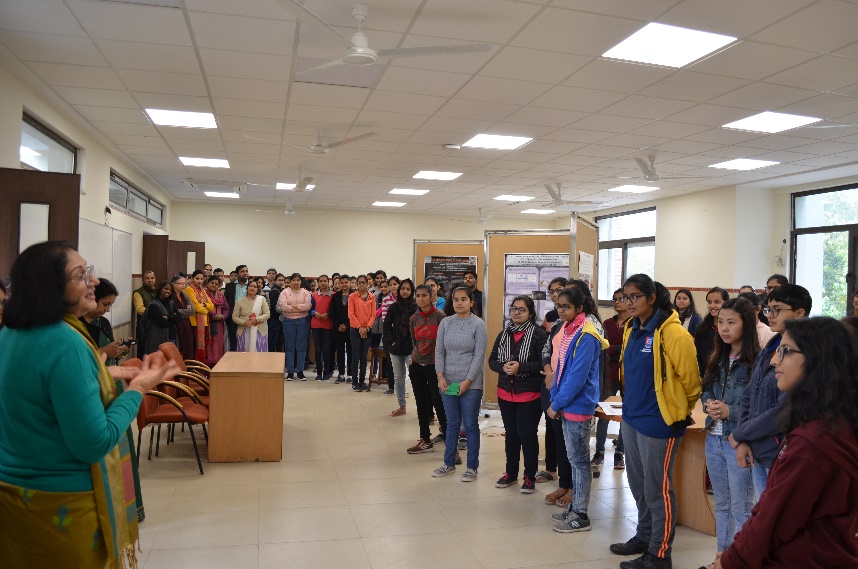
Teaching-Learning
With a diverse student population, the Department strives to deliver undergraduate teaching in a meaningful manner and create an environment where students are able to discover their potential. Besides ensuring the availability of prescribed books and supplementary reading material, the department motivates students towards consistent library work. In order to enrich the learning experience of students, faculty members use best-in-line ICT facilities. The Department ensures that internal assessment in the form of assignments, tests and quizzes is done in a manner which provides students the necessary push to excel in their coursework.
Experiential Learning
With the philosophy that teaching-learning should go beyond the classroom, the Department stresses upon project-based learning. All possible opportunities within the course structure are used to motivate students towards independent and active learning through projects, particularly through the Skill Enhancement lab courses (Instrumentation, and Energy Harvesting).
DSKC Summer Workshop
The Department motivates students to go for internship programs and summer projects in various research institutions. D. S. Kothari Center for Research and Innovation in Science Education provides immense opportunities for summer internship programs within the college itself. Under its aegis, an annual undergraduate summer research camp, named Flavor of Research, is conducted, in which the faculty members of the Department work as faculty mentors for these undergraduate projects. This annual summer camp receives enthusiastic participation from students, both from within the Department, and from other colleges, with a typical enrollment of about 100. Students typically continue with their project work even outside the bounds of the formal 6-week duration of this summer camp, making this a year-round undergraduate research activity.
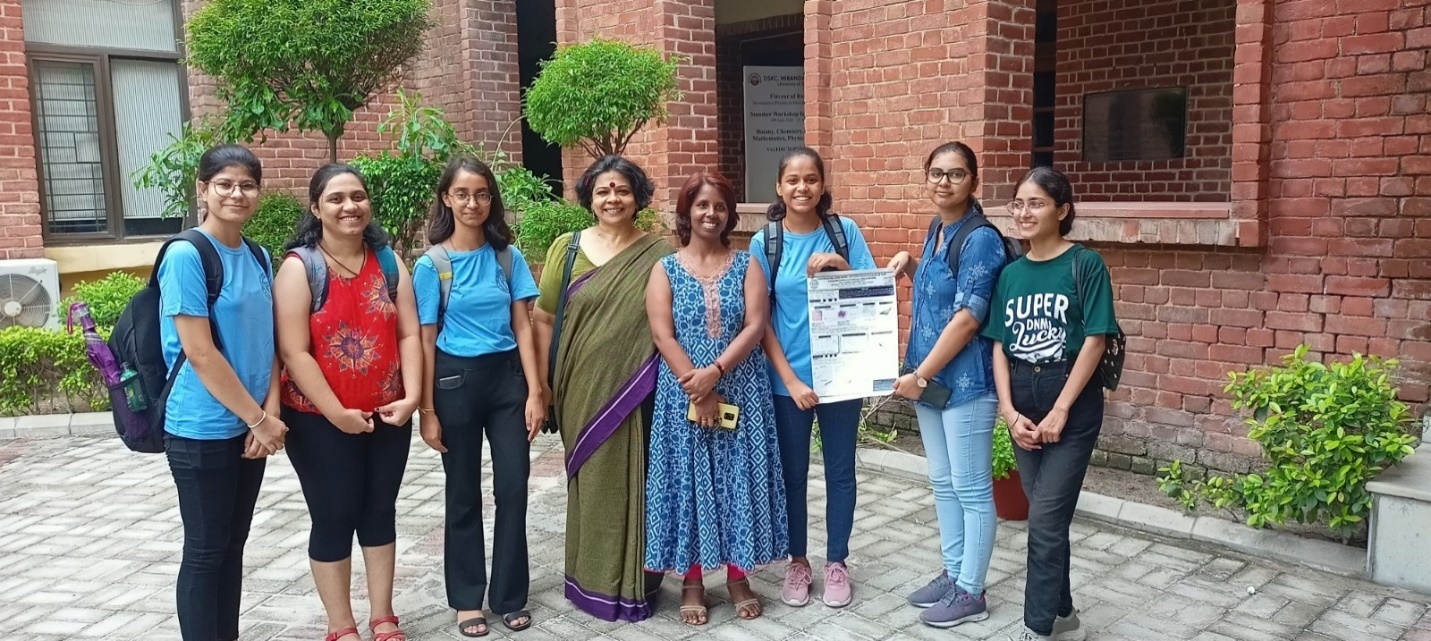
Since the Department lays a strong emphasis on going beyond the bounds of formal prescribed coursework, an active and enthusiastic involvement of students in community building exercises is an important facet of the overall growth.
Vidyut: Creating Synergy
The Department has an active student society, Vidyut, which organizes several activities for students including seminars, workshops and educational trips. This gives an opportunity to students to learn teamwork and to develop leadership qualities. In addition, the Department also has a separate, dedicated Robotics Society, which caters specifically to this exciting sub-discipline, and fosters a spirit of multidisciplinary collaboration by conducting additional student projects and seminars, which receive extensive participation from both Physics, and non-Physics students, such as from Computer Science.
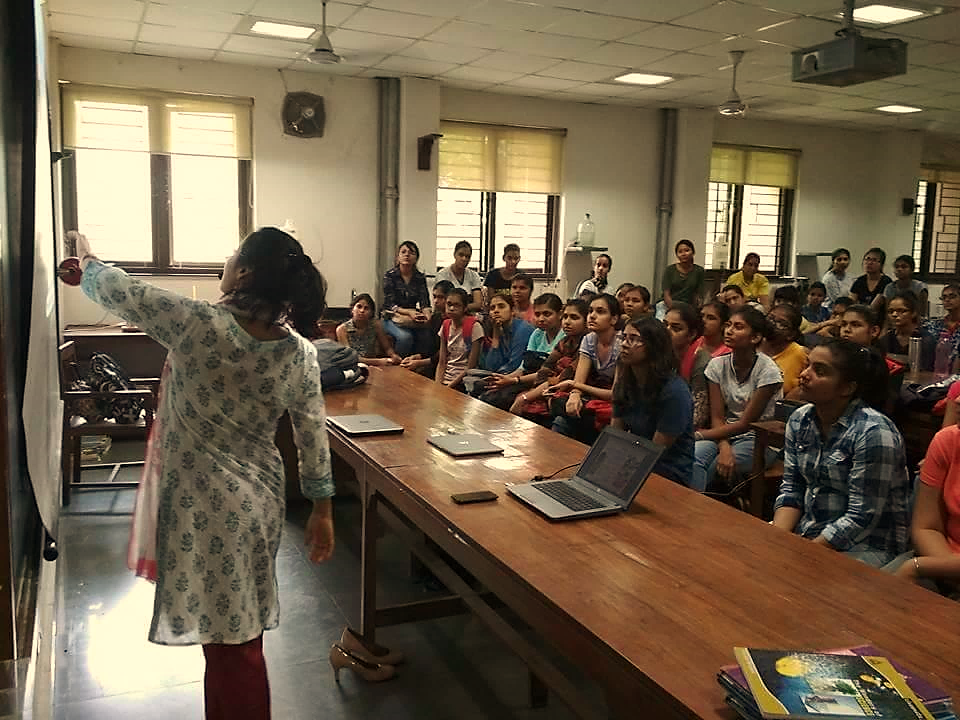
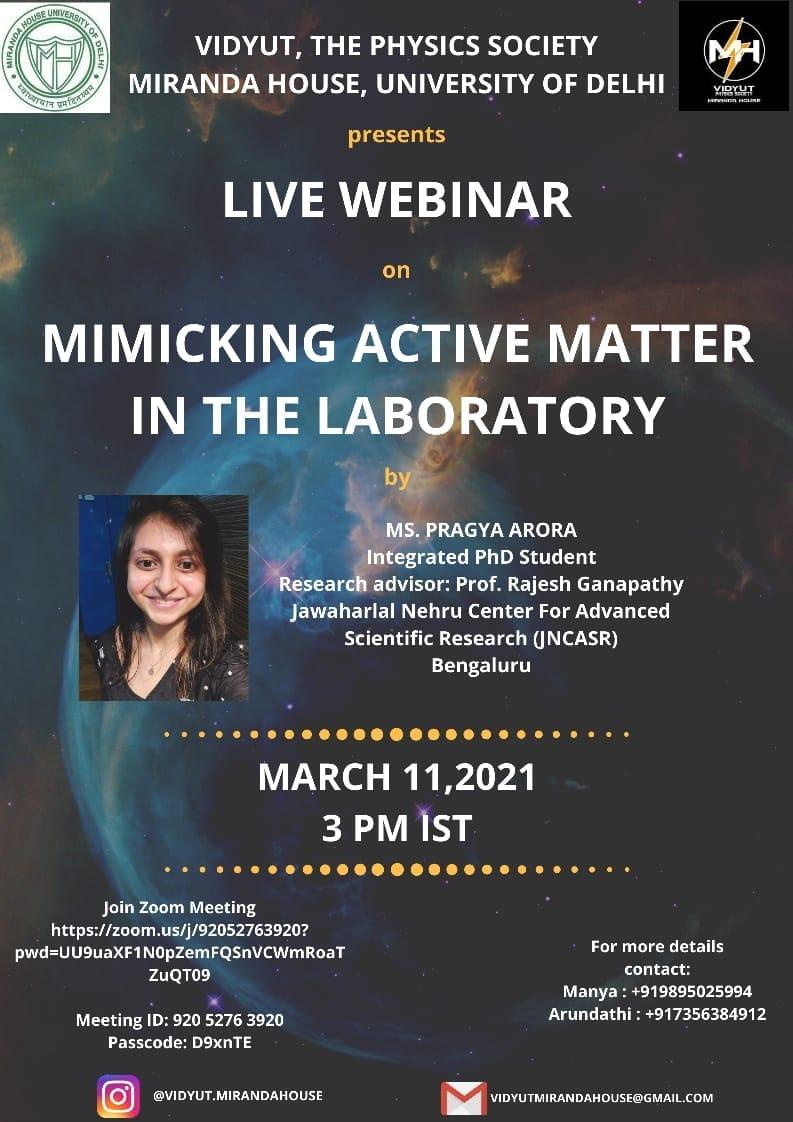
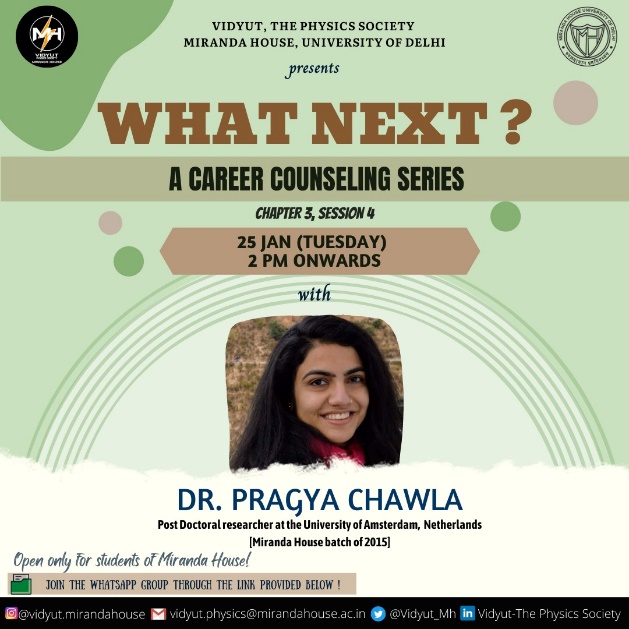
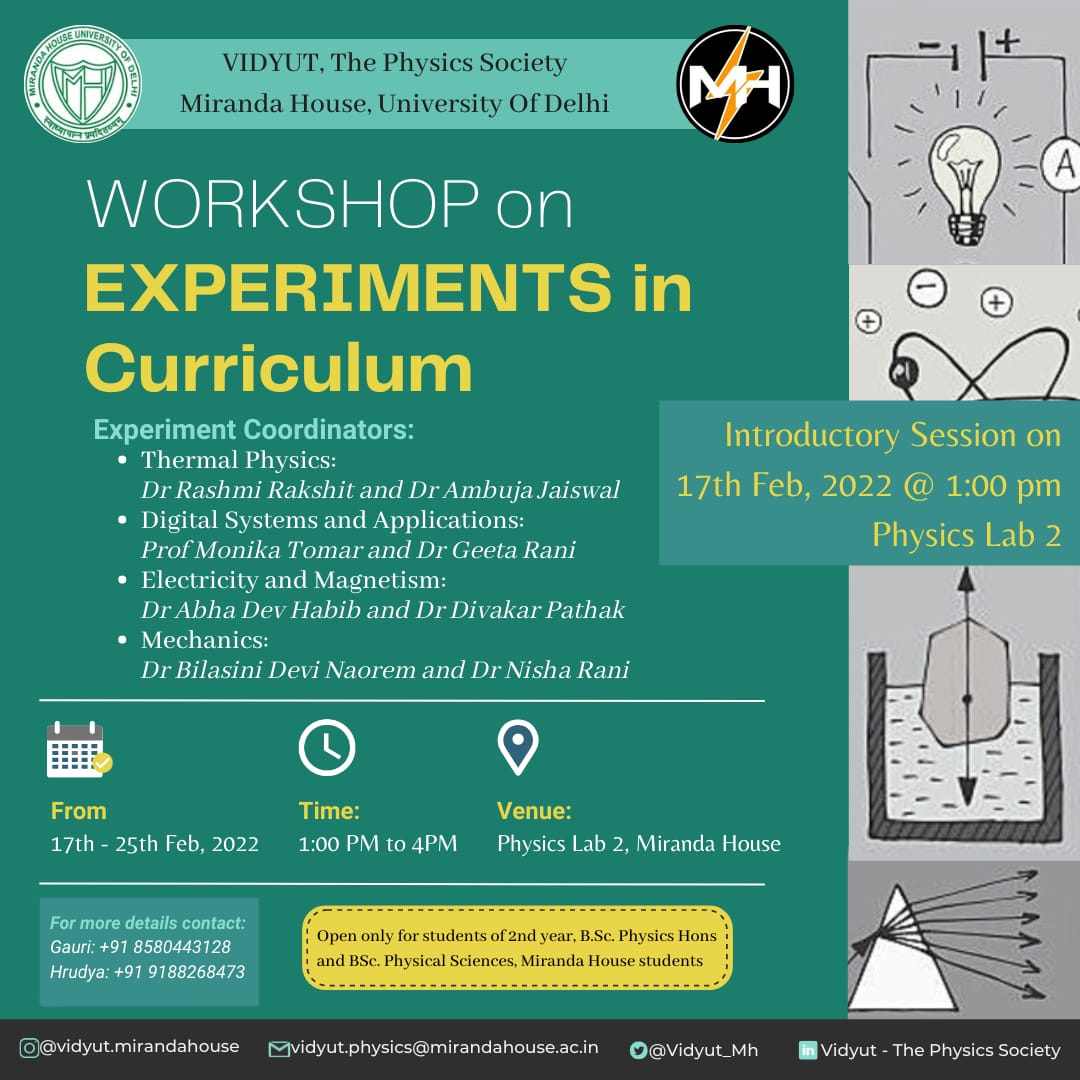
Capacity Building
The Department is committed to creating a nourishing environment where students are able to both discover and realize their complete potential, and grow overall as individuals during the course of their association with the Department. Clearly, formal teaching-learning and the semester-end examination-based-assessment of a student performance is only a small, albeit important, subset of this overall multifaceted growth which the Department strives towards.
The Department fully endorses the perspective that laying a strong emphasis on project-based learning leads to not just a more active involvement of students in the teaching learning process, but serves to develop a research aptitude which is crucially important for creating future researchers. The D S Kothari Center for Research and Innovation helped to bring project-based learning to the center stage in the College. Science Departments in the college have come together to create various platforms, giving opportunities for interdisciplinary and collaborative work. Several labs in the College were created under DSKC, two amongst them in the Physics Department. The Center created an in-house opportunity for students and teachers for doing research. A large number of faculty members in the Physics Department organize and participate in the activities of the Center, and mentor summer research projects. Also, in the last five years, an average of 60 students every year, both from within Miranda House and other colleges/universities, do their Summer Projects at DSKC.
Smart Materials and Devices Laboratory (SMDL): New opportunities
Availability of multiple sets of state-of-the-art research equipment, is immensely helpful in running various capacity building programs. In this regard, Smart Materials and Devices Laboratory (SMDL), which has been set up by Professor Monika Tomar through numerous grants, has added new opportunities for students. The SMDL features Processing lab for growth of thin films and nanoparticles, Chemico Kinetics Laboratory, and various research-grade experimental facilities, is a useful asset to the Department. Providing a truly multidisciplinary perspective to research, it helps expose the students to top-tier research environment at an early age, setting the stage for their future endeavors.
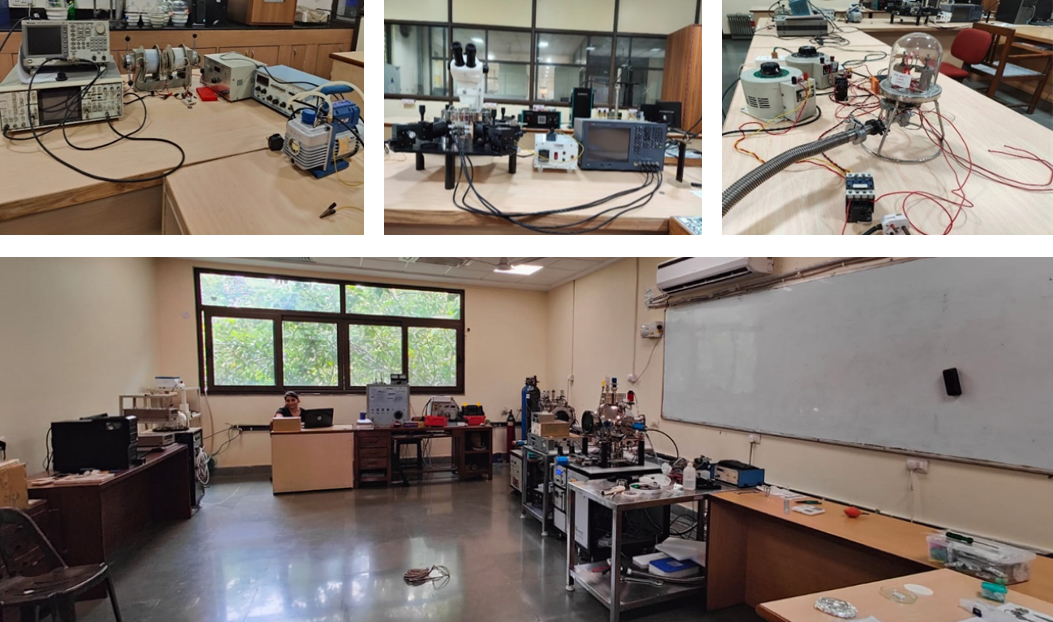
The undergraduate research activities of the Department also include participation in the Quarknet project, which is a High Energy Physics Education Outreach Project of Fermilab, University of Chicago, set up as a global network of physicists, teachers and students. The cosmic ray detector hosted in the Department, is linked to the Cosmic Ray e-Lab Portal at Fermilab, and provides an online environment in which students engaged in projects across the world have scientific collaboration with each other on the portal. This helps expose the students to the rudiments of Particle Physics research, Detector Physics, and Data Analysis. Each year, the students participate in the International Cosmic Ray Day through video conferencing with students from across the world.
Additionally, a large number of workshops for school and college teachers are also organized by the Department, which receive enthusiastic participation. In particular, every year, the following student enrichment programs are organized:
- Baseline test in Physics
- Visit to Inter-University Accelerator Center on the Science Day (28 February)
- National Graduate Physics Examination
- Workshops for students on Robotics, 3D Printing Techniques, Lab-view, Aero-modeling, etc.
- Seminars by eminent speakers on the frontiers of Physics
A crucial aspect of capacity building exercises is to organize enrichment workshops for the teachers, over and above similar exercises for the students. With this motivation, active learning techniques have been highly stressed on, and workshops to this line have been conducted on a regular basis. Via these platforms, the teachers are exposed to techniques for classroom engagement that aids them in developing critical thinking skills in their students.
The Department is glad that the immense efforts directed towards this end, are reflected in the overall student progression of the Department. Aside from excelling in the formal semester-end examinations conducted by the University, over the last few years, an increasing number of students have taken up internships at reputed Indian and Foreign Research Organizations including Princeton University, LIGO, Caltech, RRCAT, ISRO, HBCSE and SINP, with a significant number of students also building further on these internship opportunities and going on to join institutions renowned for cutting-edge post-graduate research.
Student Progression
Students of the Department have a high retention rate in Physics. After their graduation, a significant number of our students join prestigious universities and research institutes in the country, as well as overseas, to pursue master and doctoral programs in Physics. In recent years, several students have received extremely prestigious awards and scholarships to enable them to carry out postgraduate and doctoral studies. Many have diversified past pure Physics and have transitioned into interdisciplinary/applied fields. A smaller percentage of students craft their future outside of Physics, typically serving the nation through IAS or Defense services, and a few go on to pursue postgraduate programs in wholly different disciplines from top schools in the country and abroad.
While the illustrious list grows longer every year, a few notable mentions from recent years are as follows.
B.Sc.(H) Physics 2018-21
Aditi Choudhary, IISc Bangalore (Integrated MSc PhD)
Anusha Pandey, XLRI Jamshedpur (MBA)
Charu Mittal, IIT Roorkee (MSc)
Deepshikha, IIT Dhanbad (MSc)
Eishica Chand, IISER Pune (Integrated MSc PhD)
Eeshita, Tata Institute of Fundamental Research (Integrated MSc PhD)
Jasmine Chhikara, Tata Institute of Fundamental Research (Integrated MSc PhD)
Jyoti, IIT Jodhpur (MSc)
Koushiki Pohit, University of Purdue (MS)
Neha Sharma< ICTS Bangalore (Integrated MSc PhD)
Prerna Joshi, IIT Patna (MSc)
Raksha, IIT Mandi (MSc)
Saloni Singla, University of Oxford (MSc)
Seema, HRI Allahabad (MSc)
Tanu Swami, IIT (BHU) Varanasi (MSc)
B.Sc.(H) Physics 2017-20
Aiman Mushtaq, Jamia Millia Islamia (MSc Biophysics)
Anjali, IIT Mandi (MSc)
Devika Bhatnagar, University of Bonn (MSc)
Garima Choudhary, IIT Dhanbad (MSc)
Krishnananda CP, IIT Palakkad (MSc)
Lavanya, Faculty of Management Studies (MBA)
Manshi Rani, IIT Mandi (MSc)
Manya Jha, IIM Kozhikode (MBA)
Palak Awasthi, London Business School (MBA)
Pooja Poonia, IIT Kanpur (MSc, PhD)
Priyanka, IIT Madras (MSc)
Shivani Yadav, Jawaharlal Nehru University (MSc)
Shruti Sharma, IIM Kashipur (MBA)
B.Sc.(H) Physics 2016-19
Dipika Basumatary, IIM Ranchi (MBA)
Keshvi Tuteja, University of Bonn (MSc)
Pratibha, IIT Gandhinagar (MSc), University of Edinburgh (PhD)
Rashmi, IIT Gandhinagar (MSc)
Rajdeep Kaur, University of Delhi (MSc), Uppsala University (PhD)
Rajnandini Mukherjee, University of Cambridge (MASt), University of Southampton (PhD)
[Supported by Inlaks Shivdasani Cambridge Trust Scholarship]
Riddhima Puri, Ecole Normale Supérieure
Sahaja Kanuri, University of Amsterdam (MSc)
Shivani Singh, IIT Delhi (MSc)
Shipra Verma, IIT Kharagpur (Integrated MSc PhD)
Suchita Agrawal, ETH Zurich (MSc)
[Supported by Inlaks Shivdasani Cambridge Trust Scholarship]
B.Sc.(H) Physics 2015-18
Ankita Das, University of Cambridge
Divya Pal, University of Bonn (MSc, PhD)
Manisha Bansal, IIT Guwahati (MSc), IISER-Thiruvananthapuram (PhD)
Nishtha, Delhi University (MSc), Institute of Physics, Bhubaneshwar (PhD)
Radhika Prasad, IIT Kanpur (MSc, PhD)
Sarbani Chatterjee, IISER Mohali (Integrated MSc PhD)
Shreya Kapoor, University of Bonn (MSc)
Shubhangi Makkar, ETH Zurich (MSc, PhD)
Srishty Agarwal, IISc Bangalore (Integrated MSc PhD)
Sugandh Sirohi, IIT Kharagpur (MSc), IIT Madras (PhD)
Swayamsiddha Joshi, University of Zurich (MSc, PhD)
Yoshita Baruah, IISER Kolkata (Integrated MSc PhD)
B.Sc.(H) Physics 2014-17
Shefali, Aachen University (MSc)
Shivani Dahiya, NIT Warangal (MSc)
Sonalika, TIFR Radio Astronomy Center (Integrated MSc PhD)
Supriya Sinha, University of Bonn (MSc), DESY (PhD)
Unnati Akhouri, University of Oxford (MSc Physics), Penn State (PhD)
Vrinda Mehta, Aachen University (MSc)
Tamanna Jain, Cambridge University (MSc)
[supported by British Council Fellowship]
B.Sc. (H) Physics 2013-16
Arini Kar, IIT Bombay (MSc, PhD)
Pragya Arora, JNCASR (Integrated MSc PhD)
Raagya Arora, JNCASR (Integrated MSc PhD)
Shilpa Jangid, IIT Hyderabad (Integrated MSc PhD)
A few more from the yesteryears …
K. Diana Devi, IAS, AIR-24, 2016.
Ipshita Gupta, Assistant Commandant, Indian Coast Guard.
Darshana Joshi, University of Cambridge (PhD)
Nimisha Kumari, University of Cambridge (PhD)
Shikha Bhadoria, Max Plank Institut fur Kemphysik, Germany (PhD)
Students and Research
Results
Faculty Achievements
Faculty members in the Physics Department have diverse research interests, spanning across various facets of Experimental and Theoretical Physics. This lends strength to the under-graduate teaching in the Department. Teachers at our Department have actively contributed to the College and the University through their research and academic work. Some of the faculty members have undertaken a number of Innovation projects granted by University of Delhi, besides being principal investigators in nationally funded research projects. From time to time our faculty members have also shouldered administrative responsibilities within the College and outside.
Professor Monika Tomar
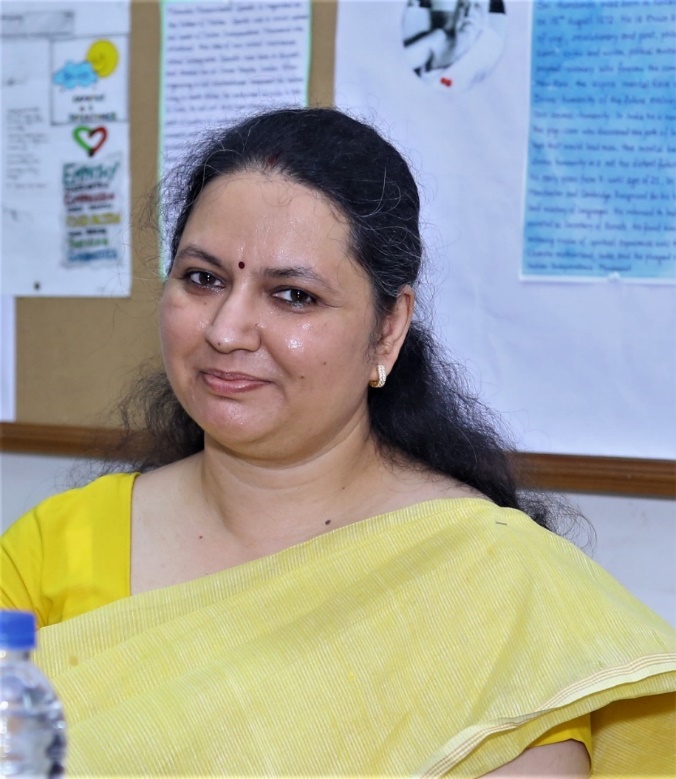 Professor Monika Tomar received “The Excellence Awards for Teachers in Colleges” at the 94th Foundation Day of Delhi University, 2016. Prof. Tomar is also the proud recipient of the very prestigious honor of being designated as Fellow, Institute of Eminence (awarded in June 2022). She heads a leading research group in the field of Experimental Material Science, with over 350 publications in journals and conference proceedings, and eight patents, to her credit. She has also supervised seven students towards their PhD, and is currently guiding four other students. She is also the principal investigator of 20 research projects, with a cumulative research grant of Rs. 2222.531 Lakhs.
Professor Monika Tomar received “The Excellence Awards for Teachers in Colleges” at the 94th Foundation Day of Delhi University, 2016. Prof. Tomar is also the proud recipient of the very prestigious honor of being designated as Fellow, Institute of Eminence (awarded in June 2022). She heads a leading research group in the field of Experimental Material Science, with over 350 publications in journals and conference proceedings, and eight patents, to her credit. She has also supervised seven students towards their PhD, and is currently guiding four other students. She is also the principal investigator of 20 research projects, with a cumulative research grant of Rs. 2222.531 Lakhs.
Dr. Abha Dev Habib
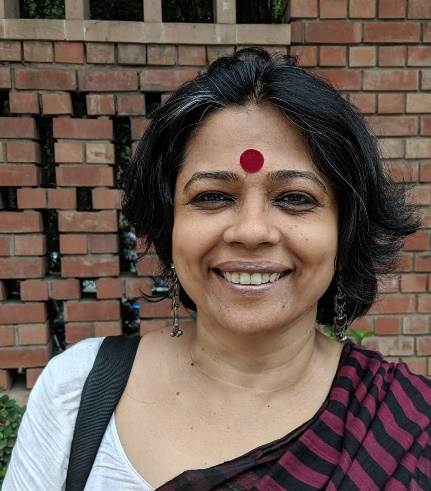 Dr. Abha Dev Habib has worked as an elected member of Academic Council (2006-08; 2008-10) and the Executive Council (2013-15; 2015-17) of the University of Delhi. This is over and above her contributions as a researcher in the field of Cosmology, wherein she has 22 publications to her credit, with a cumulative impact factor of 89.23 and having her work cited 928 times. She is also the principal investigator of DST projects to the tune of Rs. 17 lakhs.
Dr. Abha Dev Habib has worked as an elected member of Academic Council (2006-08; 2008-10) and the Executive Council (2013-15; 2015-17) of the University of Delhi. This is over and above her contributions as a researcher in the field of Cosmology, wherein she has 22 publications to her credit, with a cumulative impact factor of 89.23 and having her work cited 928 times. She is also the principal investigator of DST projects to the tune of Rs. 17 lakhs.
Distinguished Alumnae
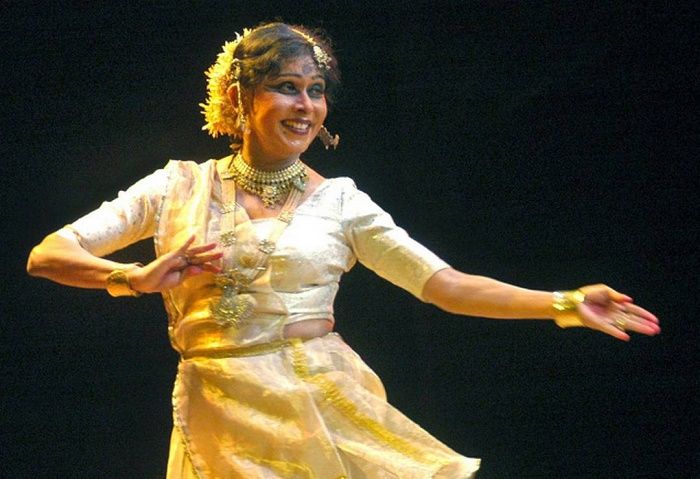 Ms. Shovana Narayan, Renowned Kathak Dancer. She was awarded Padma Shri in 1992.
Ms. Shovana Narayan, Renowned Kathak Dancer. She was awarded Padma Shri in 1992.
She studied at Miranda House in Delhi, India, graduating with a master's degree in Physics in 1972.
The Department has contributed a large number of eminent women researchers, scientists and academicians.
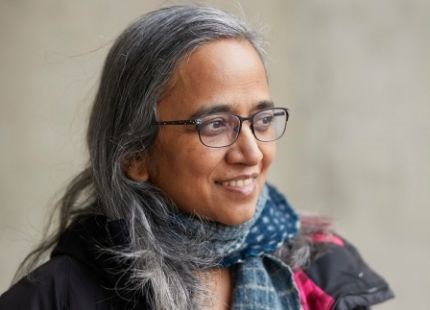 Vandana Singh, Professor at Framingham State University, U.S.A. and Science Fiction Author
Vandana Singh, Professor at Framingham State University, U.S.A. and Science Fiction Author
Singh is an author of speculative fiction, in addition to being a physicist and interdisciplinary researcher on the climate crisis.
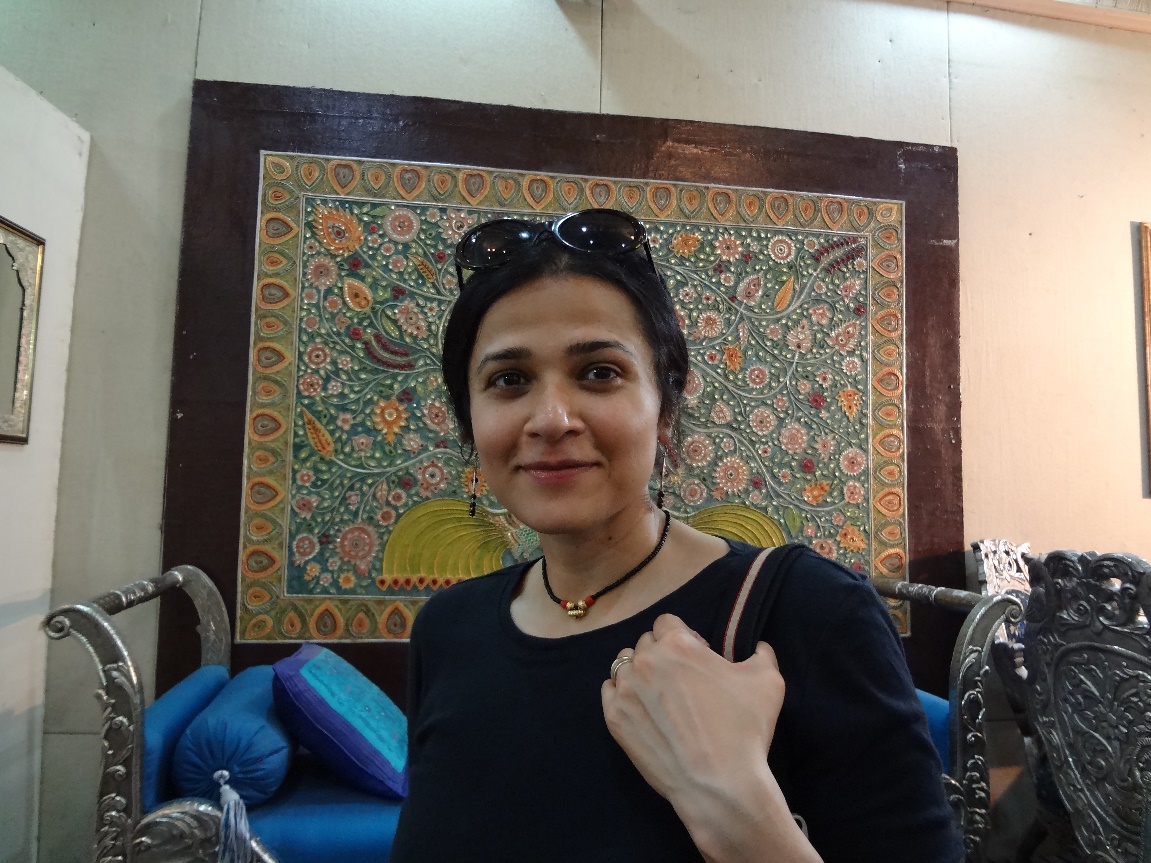 Pratibha Dev, Associate Professor at Howard University, is recipient of several awards for research including Annual NRC/ASEE Postdoctoral Research Publication Award, 2016
Pratibha Dev, Associate Professor at Howard University, is recipient of several awards for research including Annual NRC/ASEE Postdoctoral Research Publication Award, 2016
She completed B.Sc. (Hons) Physics from Miranda House in 1996 and Masters in Physics in 1998.
Defining Success
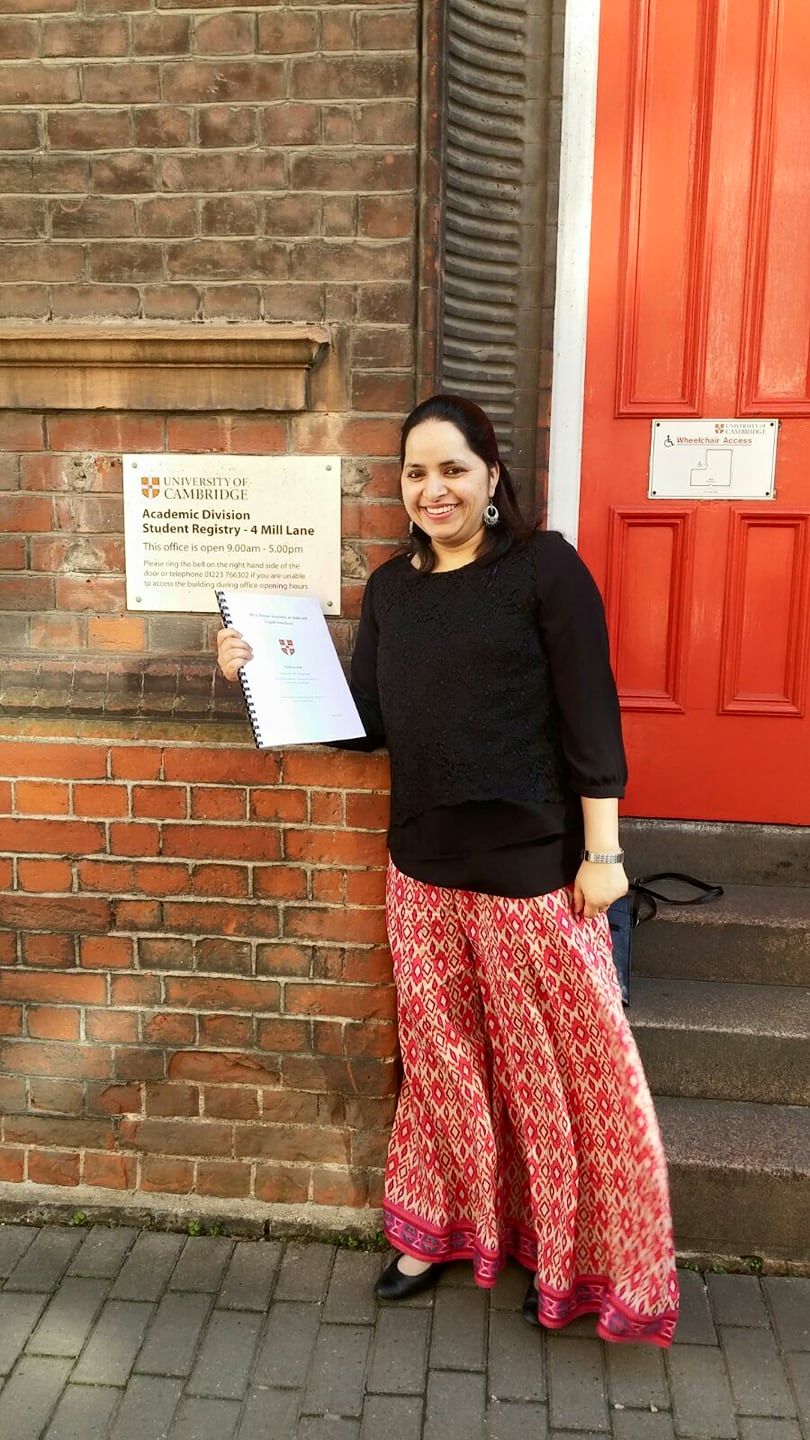 Dr. Darshana Joshi, Founder and CEO of VigyanShaala International,
Ph.D. Physics, University of Cambridge, UK.
Dr. Darshana Joshi, Founder and CEO of VigyanShaala International,
Ph.D. Physics, University of Cambridge, UK.
As a first-generation learner, the vision of VigyanShaala is rooted in her personal experience wherein timely mentoring and support enabled Darshana’s journey from a Delhi government school to Cambridge. For her work in STEM engagement, Darshana was recently awarded the Women Transforming India award from the Niti Ayog and UN Women India and winner of Falling Walls Engage 2022, a global STEM engagement competition.
Darshana graduated from Miranda House in 2009.
Darshana: “For me, MH has been the most defining pillar in my academic and interpersonal journey during my founding years. It was at MH I discovered what it meant to have a tribe to lean on, to see powerful women role models in action daily and how it strengthened my conviction for shaping the future of my dreams. Miranda truly was the wind beneath my wings.”
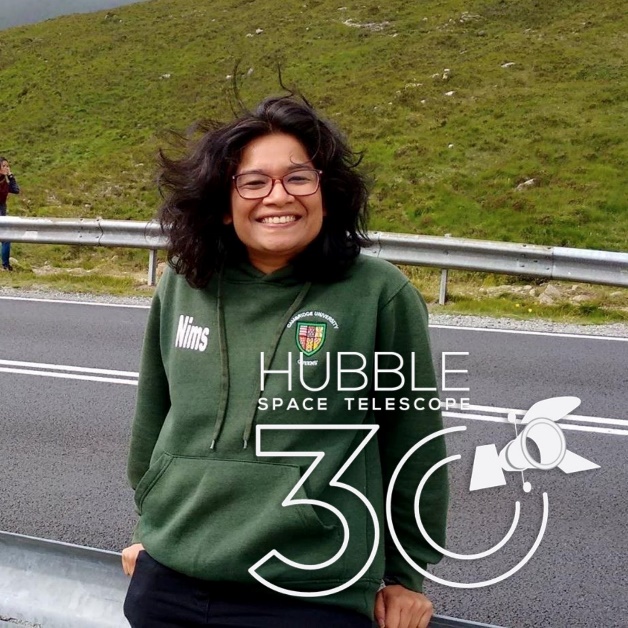 Dr Nimisha Kumari, is an astronomer employed by the European Space Agency (ESA) at the Space Telescope Science Institute (USA) to work on the joint missions of NASA and ESA.
Dr Nimisha Kumari, is an astronomer employed by the European Space Agency (ESA) at the Space Telescope Science Institute (USA) to work on the joint missions of NASA and ESA.
She is the only person from the Asian continent serving in this position of ESA/AURA astronomer. Her research focuses on answering questions related to the chemical evolution of the Universe. She completed her education at world-class institutes such as the University of Cambridge (UK), Ecole Polytechnique (France) and University of Delhi (India). She is actively involved in outreach activities, including astronomy and education in general.
Nimisha: “I am incredibly grateful for the confidence Miranda House filled me, which has helped me overcome several challenging circumstances during my studies and career abroad.”
Contributing back to the Institution
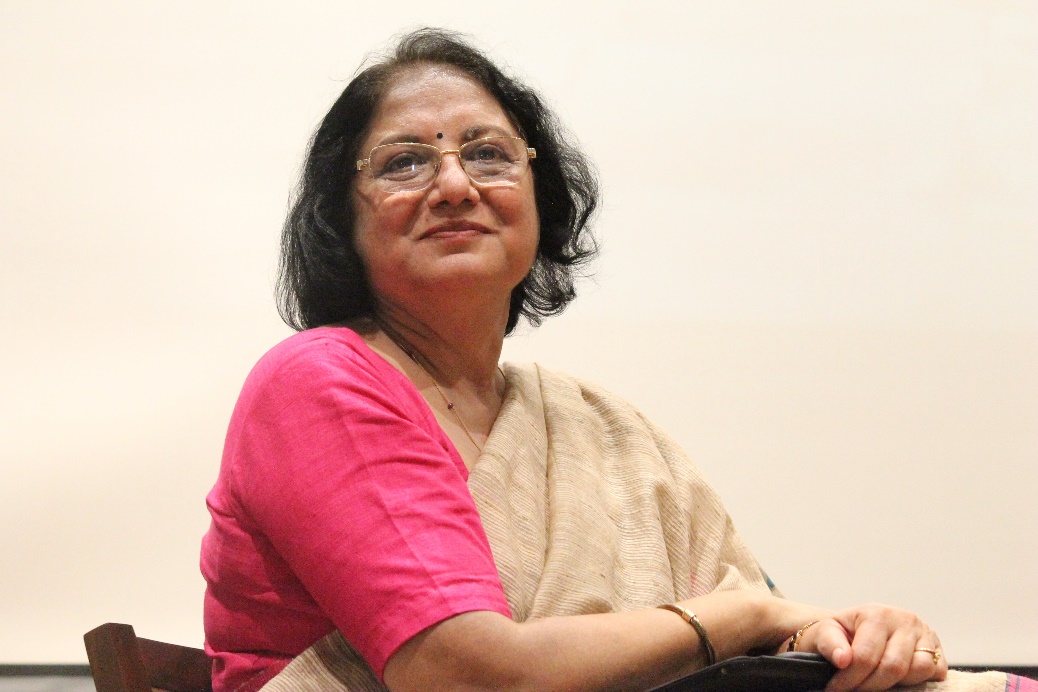 Dr. Pratibha Jolly served as the Principal, Miranda House from 2005 to 2019.
Dr. Pratibha Jolly served as the Principal, Miranda House from 2005 to 2019.
Among the most notable and recognizable alumnae of the Department, Dr. Pratibha Jolly returned to her alma-mater in 2005 as the Principal, and has uplifted Miranda House immensely through her dedicated efforts. In particular, the science departments of the college have benefited immensely from her experience of collaborative research work. She brought all the science departments together, and created platforms and new opportunities for interdisciplinary and multidisciplinary research, the most notable of which is the D S Kothari Center for Research and Innovation in Science Education. She was also instrumental in successfully organizing national and international capacity-building workshops and seminars at Miranda House.
She has received several national and international awards and fellowships for her research work, and has also served as a member of various national and international committees and editorial boards. While she superannuated in 2019, she remains a constant source of motivation for students and teachers.
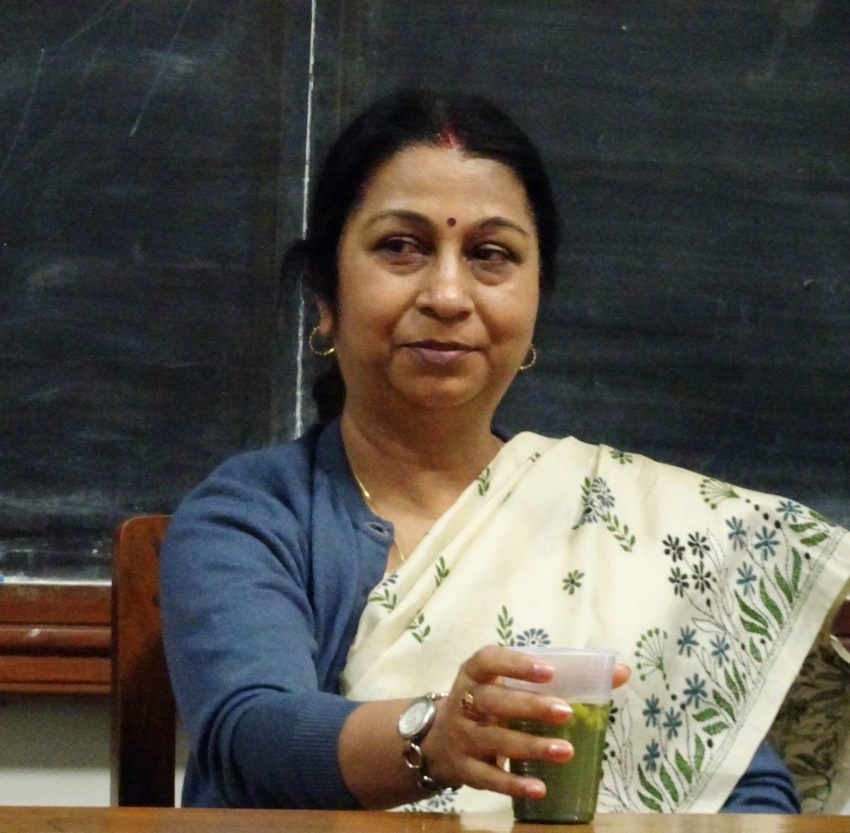 Dr. Mallika Verma, former faculty at Physics Department.
Dr. Mallika Verma, former faculty at Physics Department.
Dr. Mallika Verma, known for her commitment to Physics and students, oversaw several research projects, thereby creating new opportunities for students and teachers. She served the College in various capacities including as a Vice-Principal (2013-15) and Bursar (2011-13). She superannuated on 31.5.2021 after serving for over 35 years.
Among her many accolades, she is the proud recipient of the Australian Leadership Fellow Award.
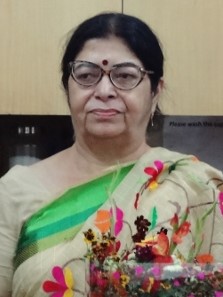 Dr. Saroj Mahajan, former faculty at Physics Department.
Dr. Saroj Mahajan, former faculty at Physics Department.
During her long and illustrious career marked by her excellent teaching and leadership skills, Dr. Mahajan served the college administratively as well, in the capacity of Bursar. She also served as Officer on Special Duty, Bhaskaracharya College Of Applied Sciences, University of Delhi.
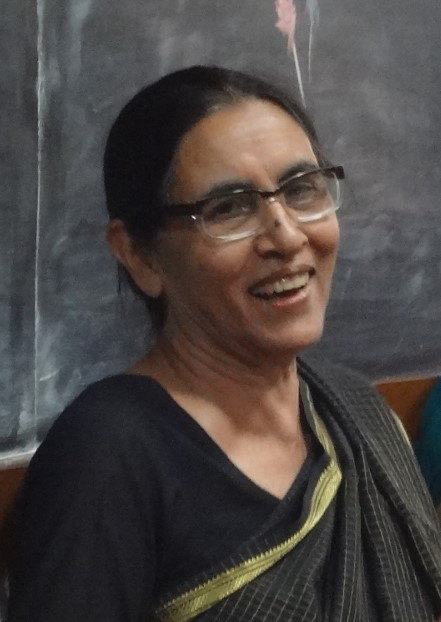 Dr. Usha Mallik, former faculty at Physics Department.
Dr. Usha Mallik, former faculty at Physics Department.
Dr. Usha Mallik superannuated on 30.6.2014.
Amongst Current Faculty…
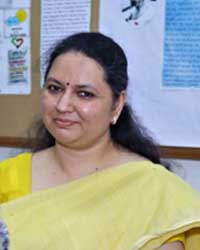
Prof. Monika Tomar
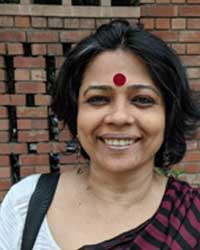
Dr. Abha Dev Habib
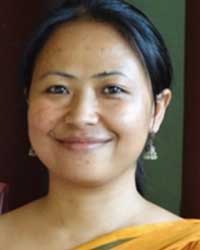
Dr. Bilasini Devi Naorem





 Unique Essay Competition
Unique Essay Competition